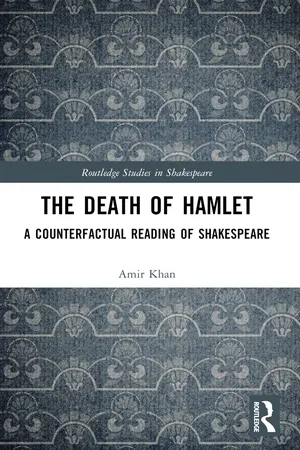
- 160 pages
- English
- ePUB (mobile friendly)
- Available on iOS & Android
About this book
This book is an intervention in Hamlet scholarship. In Thus Spake Zarathustra (1885), Nietzsche famously posited the death of God, taken to mean the dissolution of all horizons within which human beings construct a plausible ontology that gives words significance. The idea of God, as a transcendental signified (to borrow from Derrida), underwrites meaning and values. Socrates placed knowing as the highest philosophical good over two millennia ago; however, once we find that God (i.e. any transcendental signified) is unknowable, the world vanishes. In a world bereft of concepts and meaning, Nietzsche's philosophical project becomes one of "redeeming" pure willing as itself constitutive of world.
Hamlet and the criticism surrounding it is caught within competing horizons we know are circuitous and unending. We tiresomely make theoretical rounds between competing sets of interpretations that boil down to either establishing meaning within the play (the text transcending its history and revealing universal truths) or situating the text within its proper historical timeframe in order to get it to speak. In short, we are trapped between contextualizing and decontextualizing approaches. Yet we know both approaches, as competing horizons we commit to at the outset, are dead. But to abandon both at the outset means that the text, Hamlet, is itself dead. So how to get it to speak?
Frequently asked questions
- Essential is ideal for learners and professionals who enjoy exploring a wide range of subjects. Access the Essential Library with 800,000+ trusted titles and best-sellers across business, personal growth, and the humanities. Includes unlimited reading time and Standard Read Aloud voice.
- Complete: Perfect for advanced learners and researchers needing full, unrestricted access. Unlock 1.4M+ books across hundreds of subjects, including academic and specialized titles. The Complete Plan also includes advanced features like Premium Read Aloud and Research Assistant.
Please note we cannot support devices running on iOS 13 and Android 7 or earlier. Learn more about using the app.
Information
Table of contents
- Cover
- Endorsements
- Half Title
- Series Page
- Title Page
- Copyright Page
- Dedication
- Table of Contents
- Frontispiece
- Acknowledgments
- Preface
- 1. Overture, or How to do Things with Greg
- 2. Invisible Speech in Hamlet: A Cavellian Reading of Political Consent in the Present
- 3. Ah Q and Hamlet: Materialism Meets Modernity
- 4. Hamlet as Conspirator: A Reading of Julius Caesar
- 5. Timon of Athens and the Pursuit of Human Unhappiness
- 6. Marxian Coda
- Index